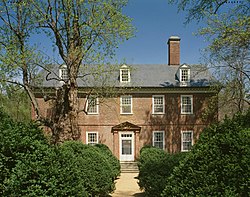Berkeley Plantation
|
Berkeley Plantation
|
|

House from the South (river) side
|
|
| Location | 8 mi. W of Charles City, Charles City County, Virginia |
|---|---|
| Coordinates | 37°19′18″N 77°10′54″W / 37.32167°N 77.18167°WCoordinates: 37°19′18″N 77°10′54″W / 37.32167°N 77.18167°W |
| Area | 650 acres (260 ha) |
| Built | 1726 |
| Architectural style | Georgian |
| NRHP Reference # | 71001040 |
| VLR # | 018-0001 |
| Significant dates | |
| Designated NHL | November 11, 1971 |
| Designated VLR | July 6, 1971 |
Berkeley Plantation, one of the first great estates in America, comprises about 1,000 acres (400 ha) on the banks of the James River on State Route 5 in Charles City County, Virginia. Berkeley Plantation was originally called Berkeley Hundred and named after the Berkeley Company of England. Benjamin Harrison IV built on the estate what is believed to be the oldest three-story brick mansion in Virginia and is the ancestral home to two Presidents of the United States: William Henry Harrison, his grandson, and Benjamin Harrison his great-great-grandson. It is now a museum property, open to the public.
Among the many American "firsts" that occurred at Berkeley Plantation are:
On December 4, 1619, a group of 38 English settlers arrived at Berkeley Hundred, about 8,000 acres (32 km2) on the north bank of the James River near Herring Creek in an area then known as Charles Cittie (sic). It was named for one of the original founders, Richard Berkeley,[citation needed] a member of the Berkeley family of Gloucestershire, England. It was about 20 miles upstream from Jamestown, where the first permanent settlement of the Colony of Virginia was established on May 14, 1607.
The group's London Company charter required that the day of arrival be observed as a "day of thanksgiving" to God. On that first day, Captain John Woodleaf held a service pursuant to the charter which specified, "Wee ordaine that the day of our ships arrival at the place assigned for plantacon in the land of Virginia shall be yearly and perpetually keept holy as a day of thanksgiving to Almighty God.".
...
Wikipedia

